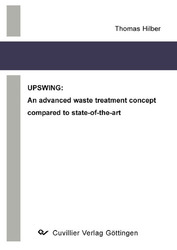| Departments | |
|---|---|
| Book Series (96) |
1381
|
| Nachhaltigkeit |
3
|
| Gesundheitswesen |
1
|
| Humanities |
2370
|
| Natural Sciences |
5408
|
| Engineering |
1795
|
| Engineering | 292 |
| Mechanical and process engineering | 862 |
| Electrical engineering | 688 |
| Mining and metallurgy | 30 |
| Architecture and civil engineering | 75 |
| Common |
98
|
|
Leitlinien Unfallchirurgie
5. Auflage bestellen |
|
Advanced Search
UPSWING: An advanced waste treatment concept compared to state-of-the-art (English shop)
Thomas Hilber (Author)Preview
Table of Contents, Datei (33 KB)
Extract, Datei (350 KB)
The present thesis is set out to assess the potential of a novel and innovative
approach for the recovery of energy from municipal solid waste, in the following
referred to as the UPSWING concept. This (theoretical) concept describes the
coupling of a waste incinerator with a conventional power plant, both on the
steam- and on the flue gas side. The waste flue gases are pre-cleaned prior to
injection into the power plant process in order to keep substances, potentially
harmful for the environment as well as for the power plant process, away from
the power plants’ boiler system.
The concept proposes significant benefits in terms of efficient waste-to-energy
conversion, but also towards the required investment costs, which are expected
to be considerably lower compared to a same-sized municipal solid waste
incinerator. The demand for such advanced concepts is given by European
Legislation, setting strict rules on landfill disposal of untreated municipal solid
waste, while promoting more environmentally friendly and more efficient waste
treatment concepts under the framework of the Community Waste Strategy
COM 399.
In this thesis the environmental, operational and economic performance of the
UPSWING concept is evaluated by means of a process comparison with other
state-of-the-art concepts. In this context, conventional municipal solid waste
incineration and direct co-combustion of waste-derived fuels in thermal power
plants have been considered. Environmental and operational aspects were
investigated by experimental and theoretical means, while the economical
aspects were theoretically assessed by a comparison of the anticipated costs for
waste treatment. Following this approach, it was possible to identify benefits
respectively deficits of the different waste treatment concepts investigated within
the scope of this thesis.
In essence, it was found that the UPSWING process is capable to maintain the
high environmental standards of municipal solid waste incineration. In terms of
process efficiency and necessary investment costs, significant benefits compared
to a standalone waste incinerator were found, while restrictions and potential
problems could be determined in terms of waste flue gas and steam integration.
Nevertheless, the UPSWING process proposes significant advantages and a
large-scale demonstration of the process could be the next step to evaluate its
overall capabilities.
| ISBN-13 (Printausgabe) | 3867275637 |
| ISBN-13 (Hard Copy) | 9783867275637 |
| ISBN-13 (eBook) | 9783736925632 |
| Language | English |
| Page Number | 168 |
| Edition | 1 |
| Volume | 0 |
| Publication Place | Göttingen |
| Place of Dissertation | Stuttgart |
| Publication Date | 2008-04-10 |
| General Categorization | Dissertation |
| Departments |
Mechanical and process engineering
|








